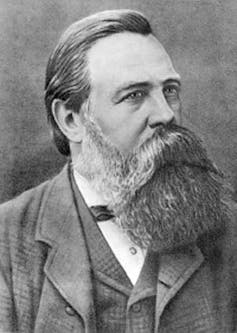THE MYTH OF THE NOBLE/GOOD SAVAGE
"in the beginning man was made right with regular, pure affections." John Wesley, The founder of the Methodist Church.
A noble savage is a literary stock character who embodies the concept of the indigene, outsider, wild human, an "other" who has not been "corrupted" by civilization, and therefore symbolizes humanity's innate goodness.
This idea appears with the philosopher Jean Jacques Rousseau during the 18th-century, who believed the original “man” was free from sin, and explained that “savages” were not brutal but noble. Through the 19th century, the idea of the noble savage receded and reverse negative stereotype of the dangerous, brutal savage prevailed. The ideal of the noble savage has led to considerable derision. But at the end the myth of the noble/good savage means that humans shloud be more happy in the nature, because civilisation destroy humans.
 |
| Fiedrich Engels, who popularised the notion of noble good savage |
The myth of savage, A study of early contact between European explorers and North American natives by Olive Patricia Dickason.
the autobiographical Confessions by Rousseau (written 1765–70) reaffirms the basic tenet of man’s innate goodness
 |
| The representation of a noble good savage |
The noble savage, is considered in Emile, ou de l'Education (1762, Rousseau), who explain the nature of man; Reveries of a Solitary Walker (1782, Rousseau), an unfinished book talking about him and find happiness in the nature;
and Confessions (1768, Rousseau).
Too sketchy.
ReplyDeleteMARINA
ReplyDeleteBLOG POST 1: The MYTH of the NOBLE/GOOD SAVAGE
--> CONTENT (Questions 1 & 3): 5/10
--> FORM (Question 2, including post design, layout and pictures + language): 7/10
Total: 12/20 Acceptable but you do not really treat the third question. I’m afraid there was a misunderstanding about the question. Besides, the origins of the myth are not mentioned.
On the other hand, there are still a few Blogger ‘gadgets’ that go missing from your blog (pages, FULL classmates’ blog list)